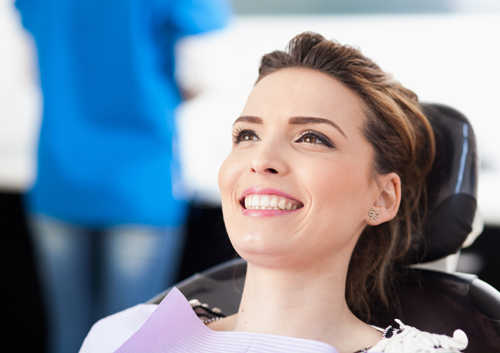August 25th, 2021

What’s in your carry-on bag? You’ve got your passport, ticket, and currency, but what about dental floss? Of course! You’re preparing for the trip of a lifetime, and we want to help make sure everything goes according to plan.
Part of your preparation before a long vacation should be a complete check-up at our Charlotte office well in advance of your trip. If there is dental work to be done, now is the time to do it. No one wants to be stuck over the Atlantic with a toothache, and changes in atmospheric pressure can cause serious problems if you have a severely compromised tooth. Tell us when you are planning on traveling, and we can schedule any procedures that should be finished before you fly.
Now that you have the all clear to travel, what about maintenance once you’re on board for a long flight? Some airlines provide toothpaste and brushes for travelers. If you have questions about the quality of the water in the airplane restroom, use bottled water to brush. There are also single-use mini-brushes available for travelers that come loaded with paste and ready to use without any water at all. Crisp fruits and vegetables can help clean teeth on-flight if brushing isn’t an option, and drinking plenty of water will not only keep you hydrated, but help cleanse your mouth and teeth as well. Be sure to travel with floss, a travel-sized tube of toothpaste, and a brush in a well-ventilated container in case you face airport delays between flights.
Taking your electric toothbrush with you? Usually there is no problem bringing your electric toothbrush in your carry-on, but do check in advance to make sure this is allowed on your flight. Most electric toothbrushes have region-specific battery chargers, so find out in advance if you will need a voltage converter or plug adaptor if you are visiting another country. Check to make sure the head is in good condition before you go and replace it if necessary.
Once you’ve landed, try to keep your dental routine as close to normal as possible while you enjoy your visit. Regular brushing and flossing are still necessary, especially if you take the opportunity to explore the local desserts. We’ve given you some tips to make your flight more comfortable—now that you’ve reached your dream destination, the rest is up to you!
August 18th, 2021

Many people dread going to the dentist. Dental visits have the reputation of being painful and uncomfortable, and it is common for people to compare unfortunate situations such as having a root canal or feeling the dentist’s drill. However, at Catawba Valley Dental Care, dental visits are not that bad.
Your regular cleaning and checkup are noninvasive. They require no drilling, Novocain, or needles, and you go home with refreshingly clean teeth. When your hygienist cleans your teeth, you are literally receiving individualized care from a professional as you sit back and relax.
In the days before the use of Novocain or other anesthetics, dental work could be painful. Thankfully, those days are gone! Now you are unlikely to feel a thing, even during the most extensive procedures. In addition, most dental work such as fillings, root canals, and crowns can be performed in one to two visits, so you do not need to keep returning to Catawba Valley Dental Care.
An incentive for getting over your fear and coming to the dentist is that getting your dental work done can dramatically improve your quality of life. Dr. Chad Vanourny can address tooth problems that have caused toothaches or prevented you from eating the foods you like. As a bonus, regular visits with Dr. Chad Vanourny and our staff allow us to identify conditions such as periodontal disease, which can indicate risk for seemingly unrelated health conditions, such as heart disease and diabetes.
August 11th, 2021

Straighter teeth is something many people desire. A nice smile is one of the most attractive things about a person. However, wearing a mouth full of braces for two, three, or more years can be a major pain, both literally and figuratively.
Luckily, there is another option. Invisalign is an alternative to traditional braces. Learn more about the benefits Invisalign offers and why you should consider this exciting method of straightening teeth.
- When you have straight teeth, your mouth is healthier in general and there is less chance of tooth decay and gum disease. Invisalign makes it possible for more people to straighten their teeth.
- Invisalign is essentially invisible. You can straighten your teeth without unsightly metal in your mouth.
- The average cost is similar to that of traditional braces, which makes it affordable for many families.
- With Invisalign, the aligner trays are smooth and comfortable to wear. Traditional metal braces can be uncomfortable and cause irritation to the mouth.
- Invisalign is removable, so you do not have to wear the system during special occasions, or when you’re eating. With normal metal braces, you are stuck with them for the entire straightening process.
- Brushing and flossing are simple. Since the system is removable, you can brush and floss just like normal.
As you can see, Invisalign is an exciting option we provide at Catawba Valley Dental Care for those who want straighter teeth. If this is something that sounds interesting to you, talk to Dr. Chad Vanourny and find out if it would work for your particular situation. Get started today, and before you know it you will be enjoying your straighter teeth.
For more information about Invisalign, or to schedule an initial consultation with Dr. Chad Vanourny, please give us a call at our convenient Charlotte office today!
August 4th, 2021

Baby teeth come with a built-in expiration date. That charming first smile is meant to make way for a healthy, beautiful adult smile. Unfortunately, before they are ready to make way for permanent teeth, primary teeth can be affected by decay, trauma, or infection—problems which can lead to damage to the pulp within the tooth. If your dentist tells you that your child’s tooth needs specialized endodontic treatment, is treatment really that much better for your child than losing a baby tooth prematurely?
Quite often, the answer is yes!
Baby teeth do much more than serve as temporary stand-ins for adult teeth. They are essential for:
- Biting and chewing—a full set of baby teeth helps your child develop proper chewing, which leads to healthy digestion. And chewing also helps build face and jaw muscles.
- Speech development—primary teeth help guide speech production and pronunciation.
- Spacing—a baby tooth serves as a place holder for the adult tooth waiting to arrive. If a primary tooth is lost too early, the remaining baby teeth may drift from their proper location. This, in turn, can cause overcrowding or misalignment of the permanent teeth when they do erupt.
Baby teeth, like adult teeth, contain living pulp tissue. The pulp chamber inside the crown (the visible part of the tooth) and the root canals (inside each root) hold nerves, blood vessels, and connective tissue. When the pulp is damaged by trauma or infected, a baby tooth can still be saved with endodontic treatment. Endodontic treatment in baby teeth can take two forms.
- “Vital” pulp is pulp that can be saved. Vital pulp therapy uses procedures to deal with damaged pulp inside the crown, or visible part, of the tooth. Pulp therapy can be used on teeth when only the top of the pulp has been affected by decay, limited exposure, infection, or trauma, but the root pulp remains healthy. Specific treatment will depend on the nature of the pulp injury, and a crown will usually be placed over the tooth after treatment to protect it.
- With non-vital pulp, your dentist will probably recommend a traditional root canal procedure. All of the pulp tissue will be removed from inside the crown and the roots, and the pulp chamber and root canals will then be cleaned, disinfected, shaped, and filled. Finally, because the treated tooth will be more fragile, a crown will be used to protect the tooth from further damage.
There can be good reasons for extracting a seriously damaged baby tooth, and there are situations where preserving the tooth is the best and healthiest option for your child. Discuss your options with Dr. Chad Vanourny when you visit our Charlotte office for the safest, most effective way to treat your child’s compromised tooth.





 Website Powered by Sesame 24-7™
Website Powered by Sesame 24-7™